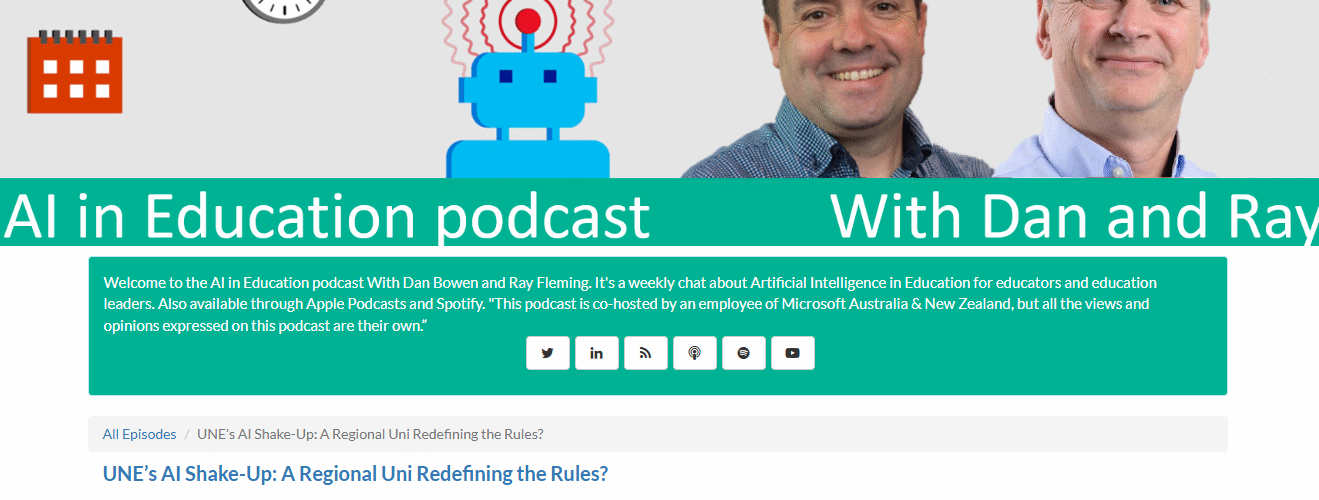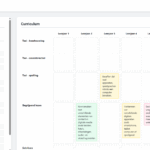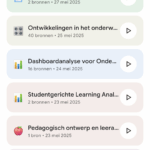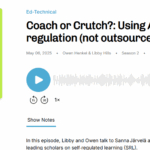Afgelopen week verscheen er een interessante aflevering van de AI in Education podcast waarin Ray Fleming in gesprek gaat met Aaron Driver van de University of New England in Autstralië over de manier waarop zij studenten toegang geven tot AI via een platform dat ze breed in de universiteit aanbieden. Niet alleen is het platform interessant, het gegeven dat ze de tools aan zowel docenten als studenten beschikbaar stellen én de redenen erachter zijn de moeite van het aanhoren waard.
Ik heb ook nu weer een geannoteerde versie laten maken door AI-Studio, Je kunt deze hierboven bekijken of via deze link. De website van Labnext70 is ook de moeite van het bezoeken waard en bij Simtheory Academy kun je gratis jun inleidende AI-training volgen. Zoals in de podcast uitgelegd wordt, is de UNE vergelijkbaar met de OU in Nederland. Studenten zijn dus meestal al wat ouder en aan het werk. Voorbeelden in de training zijn daar ook op gericht.
De gebruikte prompt (one shot, geen correcties – niet alle tijdtags werken perfect) voor de geannoteerde versie was:
The included mp3 is an episode of the AI in education podcast. In this episode, Ray sits down with Aaron Driver, Director of LabNext70 at the University of New England (UNE), a regional Australian university making one of the boldest moves in higher education: giving every staff member and every student access to a full enterprise AI platform.
Aaron shares how UNE has built Madgwick, its white-labelled version of the SIMTheory AI platform, and why the university chose to go beyond standard tools like Copilot or ChatGPT for Education. With multi-model access, MCP connectors, and soon agentic capabilities, UNE staff have already created more than 3,000 AI assistants and reached an extraordinary 85% daily usage rate.
The conversation dives into UNE’s four big reasons for giving AI to all students – safety, job readiness, equity, and privacy – and how this move positions graduates for a job market where AI capability is no longer optional.
Aaron also lifts the curtain on UNE’s rapid cultural transformation, their sector-leading AI literacy programs, and the regional impact they hope to create by becoming Australia’s most AI-enabled university.
Create a single HTML (CSS and Javascript allowed) with an mp3 player for the podcast. On the left side create tabbed navigation for the topics, selecting them gives an overview of the questions and answers within that topic and time codes that navigate to that section of the podcast.
Also create a section “question” with 5-6 multiple choice questions (4 answer options per question, 1 correct answer) to test the knowledge of the viewer.
See: https://ictoblog.com/html/Coach%20or%20Crutch%20Using%20AI%20to%20hone%20self%20regulation%20(not%20outsource%20it).html for an example of how the result can look.
The url for the online version of the mp3 is: https://traffic.libsyn.com/secure/aiineducationpodcast/S15_E1_Aaron_Driver_of_UNE.mp3?dest-id=1569005 use that for the embedded player in the html file, not the local mp3.
The online link to the podcast page is: https://aipodcast.education/unes-ai-shake-up-a-regional-uni-redefining-the-rules also include a link to that page.




